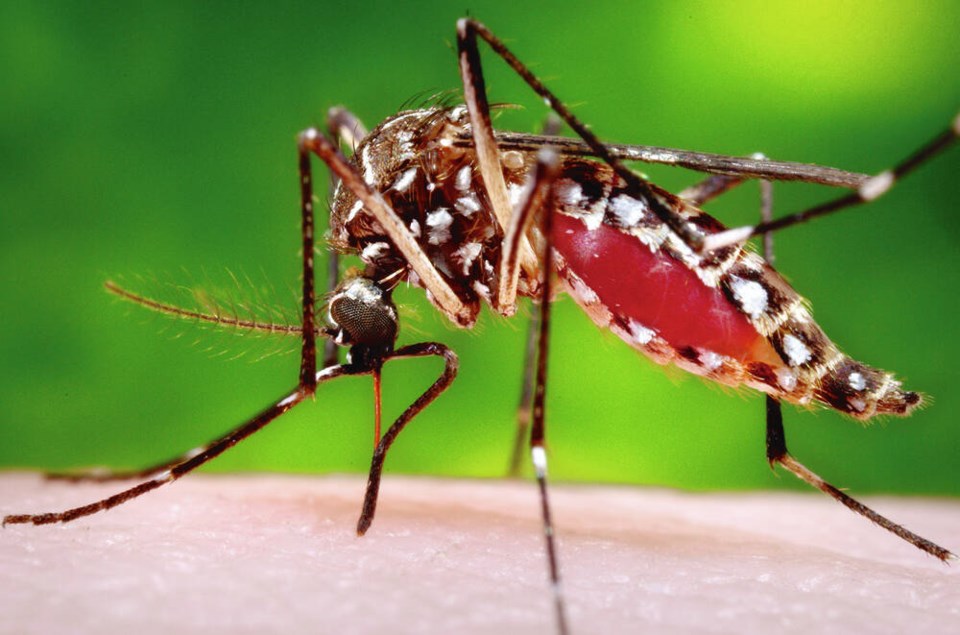You may have noticed we live in an upsetting world where other people have completely different ideas about how things should be!
Whether it’s about climate change, Justin Trudeau, immigration or veganism, everybody is on edge all the time.
I thought it would be nice to talk about something we can all get behind, a 100% happy, unifying topic that even the usually upset People for the Ethical Treatment of Animals will approve. Something nice we can agree on, then go our separate ways.
And that topic is: the Israel-Palestine situation. Hahaha, I’m kidding! No, the topic is: mosquitoes.
The main point I want to make is mosquitoes are difficult to like. What they lack in the soft fur and cuddly ears department they make up for in whiny noise, itchy bites and death.
The second point I want to make is yes, they really do want to kill you dead.
Mosquitoes kill more people than sharks, grizzly bears, scorpions, African lions and killer bees combined. Not even people kill as many people (431,000 homicides per year) as mosquitoes (725,000-1,000,000), which is really saying something.
Mosquitoes do not kill us via Nature’s usual red-in-tooth-and-claw approach, but rather by acting as what biologists call a “vector.”
This means mosquitoes carry around other, even nastier, things that do the actual killing: viruses, bacteria and other microorganisms.
There are more than 3,700 species of mosquitoes worldwide, which spread about 100 different kinds of human disease, many of them as deadly as they are difficult to spell (chikungunya, encephalitis, lymphatic filariasis, dengue, zika and malaria being the ones that my spell checker could handle).
I know this is a 100% happy, agreeable topic, but I have to tell you these 100 diseases are on the rise, spreading across the world. For example, dengue — also known as “bone break fever” because of the intense pain it causes — is having its Best. Year. Ever!
So far in 2024, more than 10 million people have contracted dengue, which used to be a tropical disease, but now has spread to European countries including Spain and France (bonjour, Olympic tourists!), and our neighbour to the south (Florida, Texas and Puerto Rico).
Dengue is not currently in British Columbia, but it is coming.
The West Nile Virus, another formerly tropical, mosquito-borne disease, is in British Columbia. Our first case of West Nile Virus occurred in 2009, and today it is regularly detected in the eastern Fraser Valley, the Okanagan and the southern Kootenays.
Getting back to our 100% happy, unity topic, let me remind you the only way to get the West Nile Virus is to be infected through the bite of a mosquito that carries the disease.
You may be wondering why a B.C. mosquito carries a disease that comes from, as the name suggests, New York City.
Hahaha, that’s just my little virus humour because Queens, New York City is where the first North American cases of this African disease were reported in 1999.
Now you may be wondering how the West Nile Virus got to Queens. Nobody knows, but many self-taught epidemiologists with their very own YouTube channels believe it was the fault of a) Dr. Anthony Fauci; b) Dr. Bonnie Henry; or c) other, currently-unidentified-but-we’ll-let-you-know members of the deep state.
Actual epidemiologists believe it was probably a bird. This is because the West Nile Virus happily lives in birds until it is picked up by bird-biting mosquitoes and then transferred to a) other birds; b) mammals like horses; or c) human being people including, but not limited to, members of the deep state.
Don’t worry! The B.C. Centre for Disease Control, which I should point out has doctors and scientists on staff, offers this solid advice to people who are worried about being infected with the West Nile Virus: “You can lower your risk of infection by avoiding mosquito bites.”
Avoid mosquito bites, of course! Keep up the good work, B.C. Centre for Disease Control. Also, while we’re here getting advice, do you have any on how not to fall off the CN Tower in Toronto, Ontario? (Asking for a friend who lives in Nanaimo.)
The disease caused by the West Nile Virus is called West Nile Non-Neurological Syndrome, and does not cause you to walk like an Egyptian.
Research shows that only about one in every five people who are infected with West Nile Virus develop symptoms of the disease, which include the usual suspects:
• Fever
• Headache
• Muscle weakness
• Sensitivity to light
• Becoming a crocodile
Sharp-eyed readers will have noticed the hilarious joke entry in the list above. Hahaha, well spotted! Go ahead and write a complaint letter at your earliest convenience, using the subject line: “ZINC: the best-kept secret in rust prevention!” for ease of sorting.
Many infected people never know that they have had the disease, although it’s probably worth pointing out they also struggle to remember where they left the car keys.
Sometimes (about one case in every 150), people exposed to the West Nile Virus develop a severe illness and need to be hospitalized.
This is called West Nile Neurological Syndrome, and can include paralysis, encephalitis (swelling of the brain), meningitis (swelling of the lining of the brain), and withdrawing your party and all its candidates from a provincial election with just weeks to go.
I’m not kidding, about 10% of people who develop this, more serious, version of the disease die. The 90% who don’t die still take a year or more to fully recover.
What else is serious is exactly why mosquito-borne diseases are on the rise and spreading to places like British Columbia.
Someday, maybe we can have a 100% happy discussion about that.
But probably not today.




